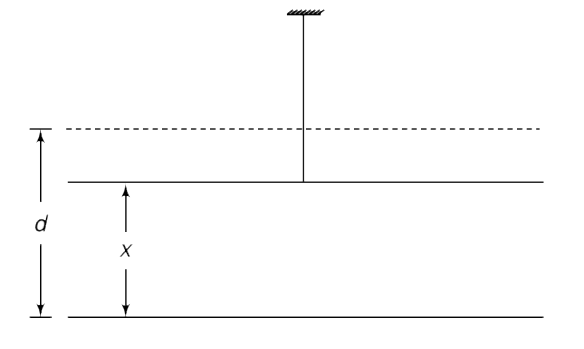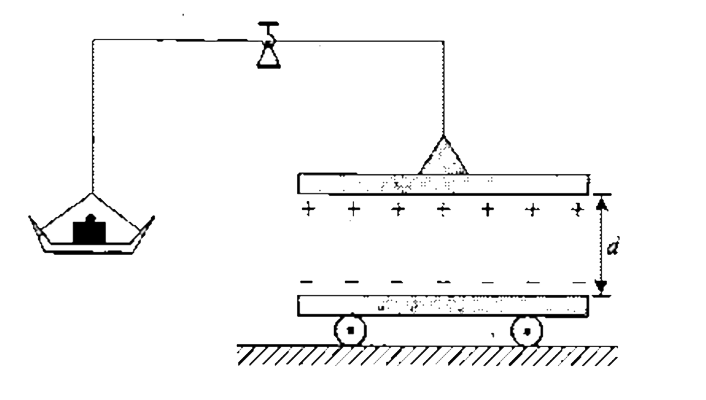Lower plate of a parallel plate capacitor is fixed on a horizontal insulating surface. The upper plate is suspended above it using on elastic cord of force constant K. The upper plate has negligible mass and area of each plate is A. When there is no charge on the plates the equilibrium separation between them is d. When a potential difference = V is applied between the plates the equilibrium separation changes to x.
(a) Calculate V as a function of x.
(b) Find the value of x for which V is maximum. Calculate the maximum value of V(=Vmax)
(c) What will happen if V>Vmax ?
(d) Plot a rough graph showing variation of equilibrium separation (x) with V

The correct Answer is:(a) V=√2K(d−x)x2∈0A
(b) Vmax=√8Kd327∈0Aatx=2d3
(c) System cannot remain in equilibrium
(d) (##IJAPHYV02C07E01048_A01##)
Step by step video, text & image solution for Lower plate of a parallel plate capacitor is fixed on a horizontal insulating surface. The upper plate is suspended above it using on elastic cord of force constant K. The upper plate has negligible mass and area of each plate is A. When there is no charge on the plates the equilibrium separation between them is d. When a potential difference = V is applied between the plates the equilibrium separation changes to x. (a) Calculate V as a function of x. (b) Find the value of x for which V is maximum. Calculate the maximum value of V (= V_(max)) (c) What will happen if V gt V_(max) ? (d) Plot a rough graph showing variation of equilibrium separation (x) with V by Physics experts to help you in doubts & scoring excellent marks in Class 12 exams.
Updated on:21/07/2023Topper's Solved these Questions
Similar Questions
Knowledge Check
A parallel plate air capacitor has capacity C distance of separation between plates is d and potential difference V is applied between the plates force of attraction between the plates of the parallel plate air capacitor is
AC2V22d2BC2V22dCCV22dDCV2dForce of attraction between the plates of a parallel plate capacitor is
Aq22ε0AKBq2ε0AKCq2ε0ADq22ε0A2KA parallel plate capacitor is charged from a cell and then isolated from it. The separation between the plates is now increased
Awill decreaseBwill increaseCwill increase or decrease depending on chargeDwill remains same
The lower plate of a parallel plate capacitor is fixed on an insulating plane as shown in figure. The upper plate is suspended from one end of a balance. Initially the capacitor is uncharged and balance is in equilibrium state. A voltage V is applied between the plates, what additional weight should be placed to maintain the balance? Consider the separation between the plates to be d and the area of each plate is A.

View SolutionThe force between the plates of a parallel plate capacitor of capacitance C and distance of separation of the plates d with a potential difference V between the plates, is.
View SolutionThe force between the plates of a parallel plate capacitor of capacitance C and distance of separation of the plates d with a potential difference V between the plates, is.
View SolutionIf A is the area of each plate, charge on it is q and potential difference is V then the distance between the parallel plate capacitor is
View SolutionThe separation between the plates of a charged parallel-plate capacitor is increased. The force between the plates
View Solution
